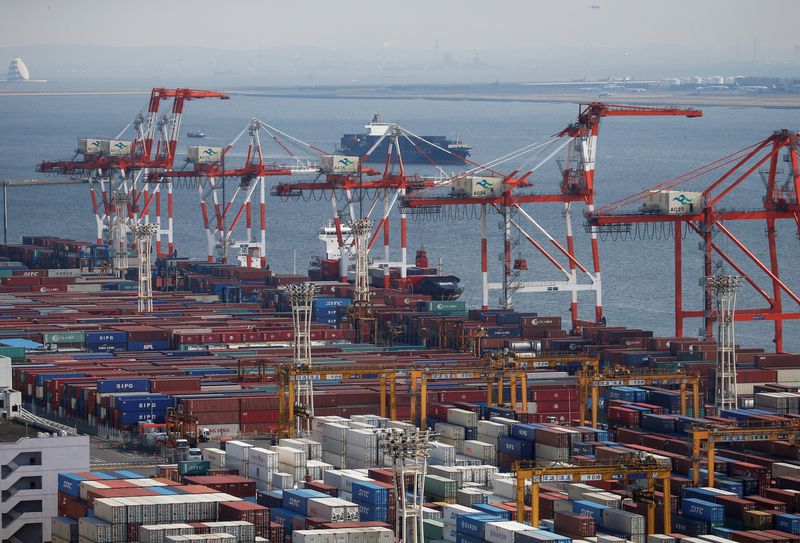By Kantaro Komiya
TOKYO (Reuters) -Japan's exports and imports in December hit record highs in terms of their value in yen, data showed on Thursday, as supply bottlenecks eased at the end of 2021 amid rising prices.
However, a persistent semiconductor shortage remained a headache for Japanese firms such as automaker Toyota, which slashed its near-term output target this week, in addition to uncertainties around the Omicron variant.
"There're considerable uncertainties" from Omicron, Takeshi Minami, chief economist at Norinchukin Research Institute said, adding it could derail various aspects of Japan's economy from firms' overseas supply chains to domestic consumption.
Exports in December rose 17.5% from a year earlier, Ministry of Finance data showed, outstripping a 16.0% gain expected by economists in a Reuters poll but below a 20.5% rise in November.
Yen-denominated exports and imports hit records of 7,881.4 billion yen ($69 billion) and 8,463.8 billion yen, respectively, biggest since comparable data became available in January 1979, largely as rising inflation affected both flows.
Steel exports rose 75.1% year-on-year by value, but the gain in export volume was 10.2%, suggesting soaring commodity prices pushed up values of made-in-Japan goods sold overseas.
Exports to the United States rose 22.1%, with car shipments marking their first year-on-year rise in five months at 11.9% as Japan's factory output rebounded.
Shipments to China, Japan's biggest trade partner, grew 10.8% in December from a year earlier.
ANNUAL TRADE DEFICIT
Imports by the world's No.3 economy surged 41.1% in December on higher raw material costs and a weak yen, versus expectations of a rise of 42.8% and growth of 43.8% in the previous month.
The led to a trade deficit of 582.4 billion yen ($5.09 billion) in December, versus expectations of 784.1 billion yen.
For the full year 2021, Japan reported a trade deficit of 1,472.2 billion yen, the first in two years and following a 388.3 billion surplus in 2020, amid higher fuel import costs.
"The rise of import costs is common among advanced economies, but (Japan's) problem is weak pass-through of import costs to domestic prices," Norinchukin's Minami said.
"The recent combination of a weak yen and high fuel costs has brought considerable damage to Japan's economy."
The Bank of Japan has said a weak yen is likely to continue to positively impact Japan's economy, even though rising import good prices hurt households.
Japan is expected to have grown by an annualised 6.5% in the last quarter of 2021 thanks to a strong rebound in consumption, the latest Reuters poll shows.
But policymakers have been wary of risks from the rapidly spreading Omicron variant, as Japan recorded its largest daily COVID-19 infections this week.
($1 = 114.2100 yen)
